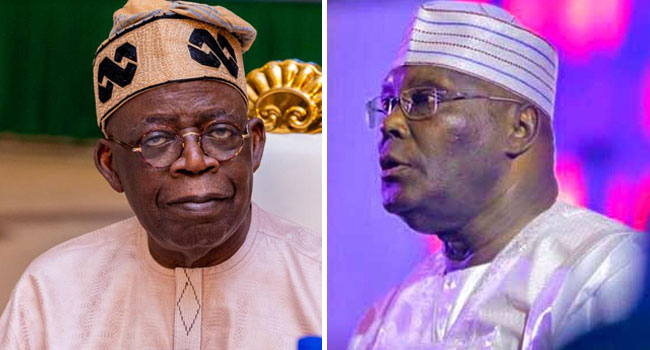A think-tank forum, Independent Media and Policy Initiative (IMPI) has said former presidential candidate, Atiku Abubakar’s critique of the economic policies of the President Bola Ahmed Tinubu administration is bereft of depth.
It alleged that the former vice president’s interventions in the public space were merely aimed at “demonising President Bola Tinubu’s policies through deceptive generalisations.”
Chairman of the Forum, Niyi Akinsiju, in a statement on Tuesday declared that the former presidential candidate in the last few days showed an uncharacteristic poor understanding of issues.
The group said it came to that conclusion after a careful analysis of Atiku’s recent public statements on President Tinubu’s policy deployments.
“In one of the statements, Waziri Abubakar sought an explanation on the conditions precedent to the Nigeria National Petroleum Corporation Limited (NNPCL) securing a $3.3billion loan from the African Export-Import Bank (Afrexim Bank) and had gone ahead to make irreverent and commonplace imputations and conclusions that we considered as belittling his status.
“The second statement queried why the President directed the NNPCL to commence payment of crude oil receipts to the Federation Account domiciled with the Central Bank of Nigeria (CBN). We find this rather perplexing knowing that Waziri Abubakar had once occupied the second highest office in the land and thus, should understand the basic nuances of the corporate power structure and decision-making process. We also find it perplexing as Atiku in his rejected “Covenant with Nigerians”, supported “transparency and accountability in the operation of NNPC Limited and associated enterprises”.
“The NNPCL had come to the public space to clarify the fact that in compliance with the Petroleum Industry Act that set it up, decided to collaborate with the CBN as its revenue receiving authority and there are indeed enough provisions of the Act to back its position.
“To our minds, a neophyte business administrator will know that a company’s board of directors has proprietary rights over the company and, by extension, its management.
“Such a decision can be made at the level of the board of directors without much ceremony, especially in consideration of the fact that the CBN is the federal government’s banker. We wonder which bank can better receive NNPC’s revenue than the CBN? The Waziri is intentional about mudslinging in this circumstance.
“The third in the series of grudge statements poignantly accused President Tinubu of policy deployment misbehaviour. We find that rather pedantic,” it added.
The policy group also compared the first full year of Atiku’s tenure as vice-president, during which he headed the Obasanjo’s economic team, with the first eight months of President Tinubu.
“In 1999 when Waziri Abubakar was sworn into office as Vice President and supposed head of the economic team, the inflation rate was 6.9 per cent, but by 2000, that is a year after, it had risen to 17.8 per cent. That was about an 11 per cent increase. We noted that there was no policy on fuel subsidy removal at this time that could have possibly triggered this rapid increase in the inflation rate.
“We contrasted this to the 22.41 per cent inflation figure in May 2023 when President Tinubu was sworn in. The latest inflation figure is for December 2023 with the figure stated at 28.92 per cent showing about a 6 per cent increase.
“This is despite the twin policies of subsidy removal, the floating of the Naira and the large population the current administration has had to manage.
“In addition, Waziri Abubakar had the added advantage of higher revenue to spend to ameliorate the economic conditions of Nigerians in that year, with earned revenue from mostly crude oil up to $15.81billion but did not reflect in the inflation figure of that year.
“In contrast, the President Tinubu-led administration has not generated up to $ 4 billion from crude oil sales from June 2023 to January 2024, yet the administration has been managing the fallouts of the removal of fuel subsidy and floating of the Naira against the background of a large population.
“While we do not contend that this is an exhaustive leadership comparative analysis template, it, however, enabled us to have a snapshot, in time, about the managerial and policy-making skills of the two personalities at issue here.
“We conclude that Waziri Atiku Abubakar underperformed in office despite the resources available to him to manage. And that he cannot manage a resource-shortfall economy.
IPMI argued that for a man who always seeks to make himself look good in the public domain, Atiku still had too many questions to answer about his time in government.





